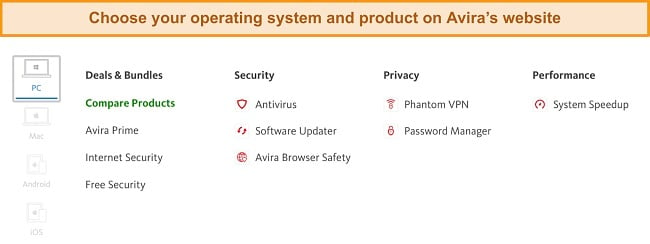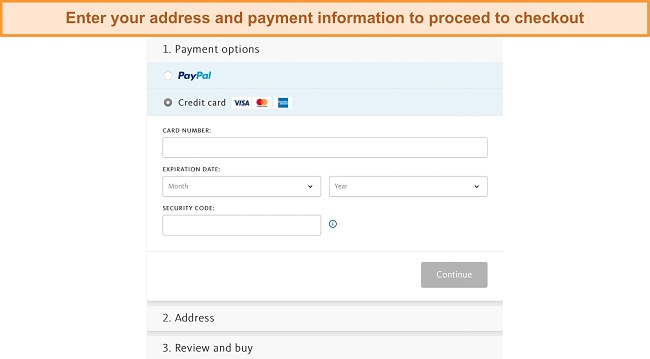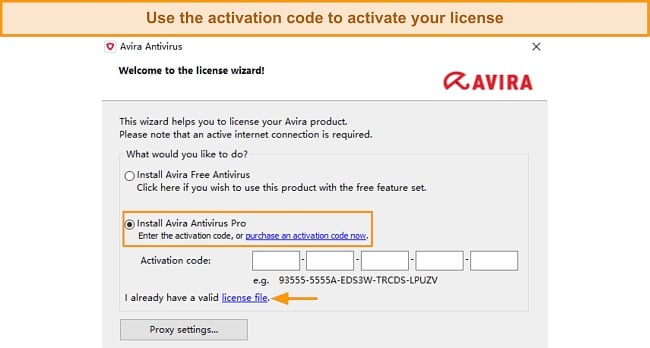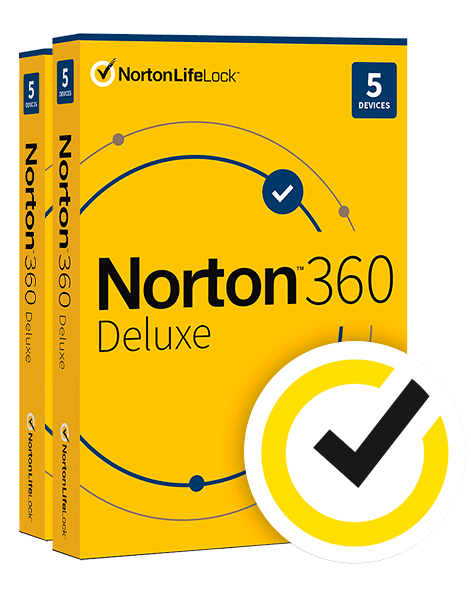Avast vs Avira — Which Antivirus Is Better? [Updated 2024]
Both Avira and Avast are famous names in the antivirus industry. Both offer free and paid plans. I wanted to see if one provided more protection than the other. I was already doubtful about Avast because it was caught selling users’ data. No matter the results, it should be used with caution. Nonetheless, I decided to put this bias aside and pit the contenders against each other.
I extensively tested both antiviruses and compared their results across 15 categories, including detection scores, system performance, useful extras, and value for money. I found that Avira leaped ahead of Avast in most categories, but it was still a close contest.
Avira gave me near-perfect detection scores and real-time protection in repeated tests. Despite lacking a firewall, it kept me safe from all online threats. It also didn’t weigh down my PC and improved my system performance with its optimization tools. I recommend you try Avira out risk-free with its 30-day money-back guarantee.
No Time? Here’s a 1-Minute Summary of Category Winners
Avira surpassed Avast in most categories and was clearly the better antivirus. However, Avast wasn’t too far behind and went neck-in-neck. Overall, Avira provides better protection, system performance, optimization tools, and value for money.
 |
 |
|
| Virus Scanner | Detects 99.6% of malware with no false positives. | Detects 98.8% of malware but gives quite a few false positives. |
| Real-Time Malware Protection | Blocks 99.96% of all real-time threats, especially zero-day malware. | Blocks 98.5% of all real-time threats, and can fail to detect zero-day malware. |
| System Performance | Uses half the system resources as Avast in a full scan. | Uses double the system resources of Avira in a full scan. |
| VPN | Offers 150+ servers in over 35 countries with poor unblocking capabilities. | Offers 700+ servers in over 30 countries with good unblocking capabilities. |
| Parental Controls | Doesn’t offer parental controls. | No parental controls were found during tests. |
| Firewall | Doesn’t have a native firewall but rather a firewall module that lets you manage Windows Defender. | Hosts a highly configurable firewall with advanced features. |
| Password Manager | Includes a password manager in its free plan and lets you save unlimited passwords. | Doesn’t include a password manager but rather a browser extension that stores your passwords. |
| Gaming Mode | Suspends unneeded background processes but doesn’t improve the gaming experience significantly. | Suspends background applications and unneeded processes to improve the gaming experience. |
| Optimization Tools | Includes Hyper Boost, Power Cleaner, and other features that substantially improve system performance. | Includes a disk cleaner and bloatware removal tool to eliminate unwanted files and programs on your computer. |
| Other Features | Offers an array of security-related extras that improve real-time protection. | Offers a handful of extras, with a few that improve security. |
| Device Compatibility | Compatible with all major platforms but its desktop and mobile apps have a consistent UI and are easier to use. | Compatible with all major platforms and has easy-to-use desktop and mobile apps, but UIs across apps are inconsistent. |
| Customer Service | Provides 24/7 live chat and an online knowledge base, with excellent response times. | Provides email support, phone support, and an online knowledge base, but response times can be slow. |
| Price | Offers 4 plans (including a free plan) and provides better value for money. | Offers 3 plans (including a free plan) and provides better value for money. |
| Free Version | Includes all the essential security features needed to protect you from viruses. | Includes only a handful of security features that provide decent but not excellent protection from viruses. |
| Money-Back Guarantee | Provides a 30-day money-back guarantee with a faster and more seamless refund process. | Provides a 30-day money-back guarantee with a relatively slower refund processing time. |
How I Tested and Compared Avira vs Avast
- Virus Scanner — I looked at what types of scans each contender offers and tested their detection scores across multiple scanning tests.
- Real-Time Malware Protection — I checked whether each antivirus has real-time protection features, such as a browser extension, to detect viruses in real-time.
- System Performance — I tested how resource-heavy each antivirus is in terms of CPU and disk utilization.
- VPN — I checked if each contender’s VPN provides decent speeds and could access my favorite streaming platforms.
- Parental Controls — I considered which antivirus provides more easy-to-use and feature-rich parental controls.
- Firewall — I checked for a firewall and what features it offers. I also tested its efficacy in terms of web security.
- Password Manager — I gauged a password manager for ease of use and superior auto-fill functions.
- Gaming Mode — I checked the contenders’ gaming modes, how many features/modes they offer, and how well they allocate system resources while gaming.
- Optimization Tools — Optimization tools are a must-have for any antivirus. I considered how many tune-up tools each antivirus offers.
- Other Features — I accounted for the useful extras Norton and Trend Micro provide in their plans.
- Device Compatibility — I checked which operating systems (and their versions) each antivirus supports and how user-friendly are their desktop and mobile apps.
- Customer Service — I tested various customer support options for each contender and evaluated response times and ease of reaching out to the support team.
- Price — I compared the price plans of each contender to determine which plan offers the best value for money.
- Free Version — I checked for any free plans available and tested them out.
- Money-Back Guarantee — I tested the money-back guarantee first-hand to see how seamless the refund experience was for each antivirus.
1. Virus Scanner — Avira Features a More Powerful Malware Scanner
After rigorously testing each contender’s malware scanner, I found that Avira’s virus scanner was more accurate than Avast’s.
Avira hosts 2 scan types — a smart scan and a full system scan. Its smart scan checked my hard disk in 2 minutes, but I won’t recommend using it unless you’re in a hurry. That’s because it doesn’t scan non-critical areas of your drive and might overlook malware hiding in the unassuming areas on your PC.
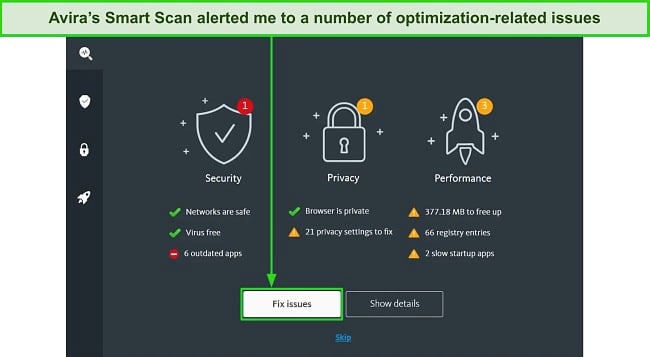
During my tests, Avira’s full scan checked 1.8 million files on my hard drive in 56 minutes. That’s not very fast (yet still faster than Avast), but I’m happy to report that it detected 99.6% of all viruses I had planted on my PC. It only missed a few zero-day malware hidden inside zip files.
Avast offers multiple scan options, including full scan, targeted scan, boot-time scan, quick scan, smart scan, and custom scan. I especially liked the boot-time scan, which scans your PC and removes well-hidden threats before your PC boots up. However, l recommend running the full scan for the best results.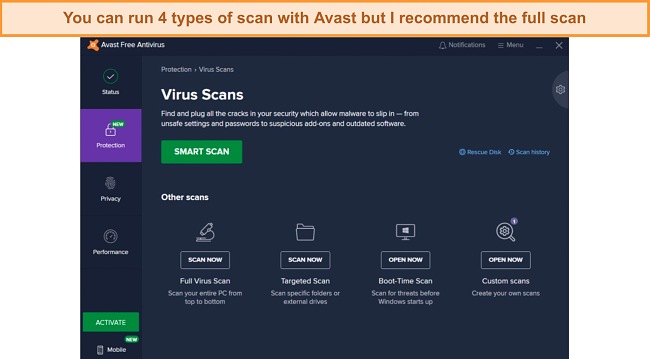
The full scan option from Avast checked 1.4 million files in a little more than an hour, providing a detection score of 98.8%. It missed more viruses than Avira and gave me 10 false positives (falsely flagging legitimate files as unsafe). On the contrary, Avast didn’t give me any false positives.
Overall, neither antivirus could deliver a perfect detection score — for that, I recommend you get Norton 360 — but Avira came out ahead in the race.
Virus Scanner Winner: Avira
2. Real-Time Malware Protection — Avira Offers Near-Perfect Real-Time Protection
Avira’s real-time protection capabilities are miles ahead of Avast’s. I extensively tested both antiviruses to see how well they block threats in real time. To conduct my test, I downloaded several EICAR virus samples on my PC and turned on each antivirus to see which one had better detection abilities.
Avira blocked all but one virus sample, a zero-day malware packed inside a zip file. It gave me a near-perfect detection score of 99.96%, which is impressive compared to the industry average of 97%. In contrast, I was pretty disappointed by Avast’s results. It failed to block 4 out of 7 sample viruses on my PC, and 2 of them weren’t even hidden inside zip files.
Apart from that, Avira has a web protection feature that keeps you safe from online threats. I used its “Browser Safety” extension on my browser, which kept me away from potentially dangerous websites and prevented me from downloading malicious files from the web. Avast also includes this feature and provided me with similar results.
Overall, Avira’s real-time protection capabilities are superior to Avast’s. However, I’m happy that both antiviruses pack a web protection tool to make your online experience safer. I prefer having perfect real-time protection, which is why I use Norton 360 as my everyday antivirus.
Real-Time Malware Protection Winner: Avira
3. System Performance — Avira Is Significantly Lighter
After rigorously testing each antivirus for how efficiently it manages system resources, I found that Avira was significantly lighter on my PC than Avast. To conduct my test, I recorded my baseline levels of CPU, memory, and disk utilization and compared them to the new levels while running each contender’s full scan.
According to my results, Avira used less RAM and CPU resources than Avast with and without a scan. When I ran Avira’s full scan, I didn’t notice any lag, and I could multi-task, browse the internet, and stream Netflix without any problems. I noticed some lag when installing a resource-heavy app (Adobe suite) on my PC.
Avast wasn’t too heavy on my system but was slightly more resource-intensive than Avira. I could browse the internet, work on Google docs, and open multiple tabs on Chrome without a scan. However, I noticed some lag when I ran its full scan and had to close unnecessary tabs on my Chrome browser. The lag became substantially evident when installing Adobe suite on my PC, but I’m glad my system didn’t freeze.
In summary, Avira was lighter on my PC than Avast. It delivered slightly faster scans at lower resource usage, which means it utilizes system resources more efficiently. However, after comparing Avira to Norton, I found that Norton was significantly lighter on my PC. Keep in mind that I have a high-end PC with a powerful CPU, so your experience might differ from mine.
System Performance Winner: Avira
4. VPN — Avast’s VPN Provides More Servers and Better Speeds
Avast’s VPN gave me better performance in terms of speeds and unblocking capabilities. However, it’s only available in its premium plan (Avast Ultimate). In contrast, Avira’s VPN is available on all plans but has a data cap unless you upgrade to the premium plan (Avira Prime).
Avast’s SecureLine VPN hosts over 700 servers in more than 30 countries. While that’s not an extensive server network comparable to some of the top standalone VPNs, it does a fine job unblocking your home content when traveling. I could easily access my home streaming channels, including Netflix US, Prime Video, Hulu, Vudu, HBO Max, and Disney+.
It provided me with fast speeds on nearby and mid-range servers. I could stream content in perfect HD without any problems. However, I got speed drops of up to 60% on distant servers, and my streaming experience was punctuated with buffering.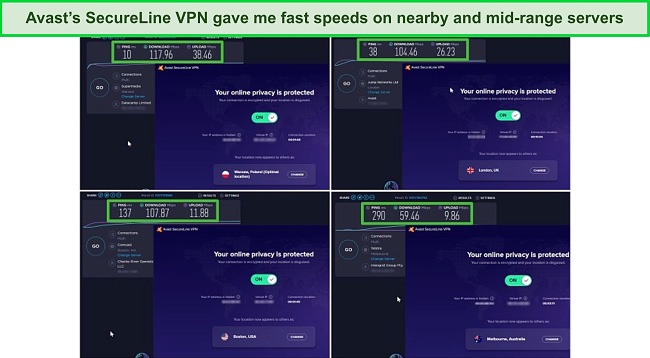
Avira’s PhantomVPN is available on all plans but has a data cap of just 500MB per month — only its premium plan provides unlimited VPN usage. With a limited server network of only 150 servers in 37 countries, PhantomVPN isn’t ideal for unblocking your home content while traveling. I could access my Netflix US and Disney+ accounts but not Hulu, Vudu, Prime Video, and HBO Max.
I got decent speeds on nearby servers, but some servers gave me speed drops of up to 25%, which is a concern if you don’t have a high-speed internet connection. On distant servers, my speed drops increased to over 60%, and I had difficulty just surfing the web.
Overall, Avast’s SecureLine is the superior VPN when it comes to speed and unblocking capabilities but still doesn’t compare to some antiviruses with a built-in VPN. Keep in mind, however, that Avast was caught selling its users’ data to third parties, so I won’t be too quick to trust its no-logs claims about the VPN. Both contenders have a relatively small server network compared to a premium VPN like ExpressVPN.
VPN Winner: Avast
5. Parental Controls — Neither Contender Offers Parental Controls
I was disappointed to learn that both antiviruses lack essential features like parental control, even on their premium plans. I consider this a must-have feature for any good antivirus. Every parent needs to have parental controls with their antivirus subscription, so I recommend using Norton 360 because it not only provides perfect security but comprehensive parental controls for you to monitor your child’s activities.
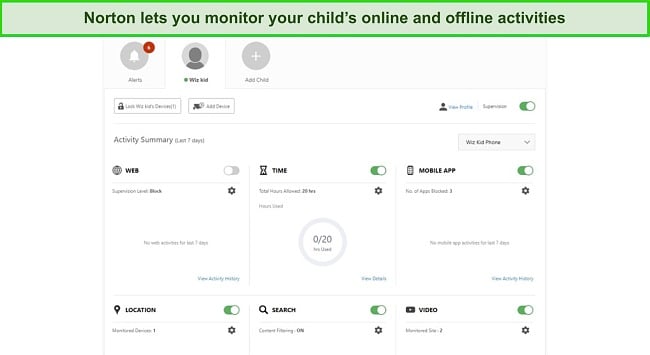
Norton lets you create up to 15 child profiles, which I think is more than enough for any parent. Each profile is linked to a separate device and you can monitor and track its usage remotely. You can limit your children’s screen time, block inappropriate websites, filter content in search engines, and even block a device entirely.
Parental Controls Winner: Tie
6. Firewall — Avast Hosts an Advanced Firewall
Avast’s highly configurable firewall came as a pleasant surprise. On the other hand, I was disappointed to learn that Avira doesn’t have its own firewall. Instead, it offers a firewall module that lets you manage Windows native firewall (Windows Defender) from within Avira’s app. I’ve tested Windows Defender multiple times and learned the hard way that it’s not enough to keep you safe from online threats.
Once you set it up, Avast will automatically configure its firewall based on your network connection. When connected to a private network, it’ll be more trusting towards incoming internet traffic as compared to when you’re on a public WiFi network.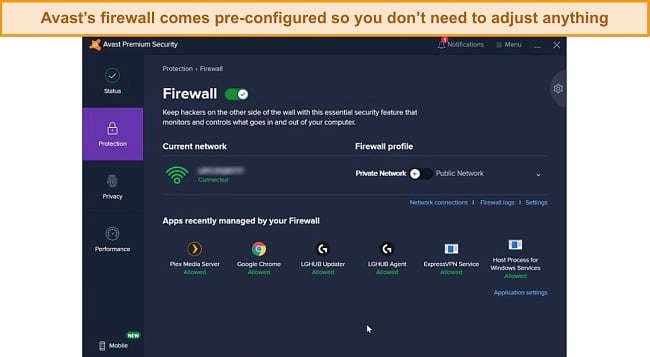
I especially liked its “Stealth Mode,” which makes your device invisible to others when connected to a public network. This gave me peace of mind that no hacker could detect my device or hack into it to steal my data as long as I was invisible.
Overall, Avast’s firewall is great, but I would’ve liked to see it have more advanced features, such as intrusion detection, WiFi protection, firewall history, and more. McAfee’s firewall offers all these settings and ample customizability to keep you safe from even the most complex online threats.
Firewall Winner: Avast
7. Password Manager — Avira Offers Excellent Password Management
I was delighted to learn that Avira offers its password manager on every plan (even the free one)! On the other hand, Avast used to provide a full-fledged password manager on its paid plans, but now, it only offers a feature to protect passwords saved on your browser.
Avira’s password manager lets you save unlimited passwords — that’s impressive given that many other antivirus password managers cap the number of passwords you can save. It also comes as a browser extension for Chrome, Firefox, and Opera, so you can use it on multiple devices simultaneously as long as you have the extension and are signed in to your vault.
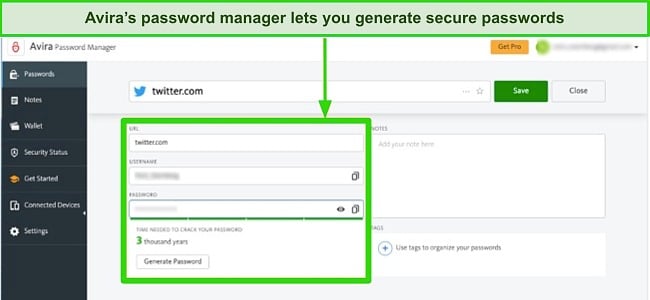
I was impressed by Avira’s password generator, which lets you create strong passwords in just a click. It also shows how long it will take for a hacker to decrypt your password. For instance, the password I generated for one of my social media accounts was so strong that it would take a hacker 3000 years to hack it. Having this information helps you gauge the strength of the generated passwords.
Overall, Avira’s password manager is an impressive tool for managing all your passwords and sensitive data, including bank account information and credit card details. However, it lacks certain advanced features such as a password auditor and password sharing, available on top-tier antiviruses like Norton 360.
Password Manager Winner: Avira
8. Gaming Mode — Avast Significantly Enhances Your Gaming Experience
I’m not an avid gamer, but when I play games on my PC, I expect no frame drops while gaming in Ultra HD. Avast’s “Do not disturb mode” (formerly known as “Game Mode”) provided me with a near-perfect gaming experience, much better than Avira’s gaming mode.
Avast’s “Do not disturb mode” does much more than silence notifications while you’re gaming. It suspends unnecessary background processes and allocates more resources to your game to get the highest FPS (frames per second) with no drops.
I usually get frame drops when playing resource-heavy games like The Witcher 3, especially when something’s running in the background. However, I got no frame drops with Avast’s gaming mode.
Avira’s “Game Mode” gave me a decent performance too, stopping unneeded background processes to allocate more resources to the game. However, it didn’t close some apps in the system tray like Skype that I don’t even use. As a result, the resource allocation wasn’t perfect, and playing The Witcher 3 on Ultra HD wasn’t as seamless.
Therefore, Avast’s “Do not disturb mode” gave me a more seamless gaming experience than Avira’s “Game Mode.” However, Norton’s gaming mode is more potent because it allocated resources on my PC more efficiently than Avast.
Gaming Mode Winner: Avast
9. Optimization Tools — Avira’s Tune-Up Facility Improves System Performance
Avira’s optimization tools are better than Avast’s in improving your system performance.
Avira’s “Hyper Boost” feature reduced my PC’s boot time by 6 seconds, which is a lot for a high-end PC. This boost will be greater if you have a mid-tier system that boots up in 20+ seconds.
Its “Power Cleaner” tool does an exceptional job at clearing up your hard drive from junk and duplicate files and your browser from trackers and cookies. It took only 2 minutes for the scan to detect and clear over 1GB of junk on my PC.
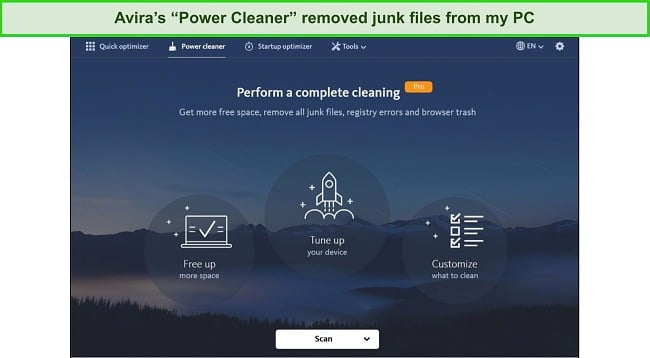
Avast’s optimization tools are decent but are only available in its premium plan (Avast Ultimate) — I don’t think they’re worth paying extra for. Its disk cleaner feature removed 5GB of junk files and cookies from my hard drive and browser, respectively. I also liked that it detected potentially unwanted programs (PUPs) and any pre-installed software with its anti-bloatware tool.
In summary, I didn’t notice that my PC got substantially faster with Avast’s optimization tools. Therefore, Avira wins this round but only by a slim margin. To a user who wants an array of optimization tools, however, I recommend TotalAV because it’s packed with an entire tune-up facility.
Optimization Tools Winner: Avira
10. Other Features — Avira Offers More Useful Extras
An antivirus without additional features isn’t worth buying, and I was happy to see both contenders offer a few useful extras with their plans. After taking a closer look, I found that Avira hosts more extra features than Avast.
Avira offers the following additional features:
- File optimization tools — Packs a file shredder, disk defragmenter, and a file encryption/recovery feature.
- Process Manager — Monitors all running processes and halts unnecessary ones that slow down your computer.
- Network Traffic Manager — Tracks your network traffic and safeguards you from any suspicious incoming connections and stops apps from connecting to the internet without your consent.
- Safe Shopping — A browser extension on Chrome, Edge, and Opera that scans every URL you visit and blocks ads and trackers to keep your sensitive information safe.
I especially liked Avira’s Safe Shopping feature. It scans a URL to ensure it’s safe before opening it. It also blocked 12 ads and trackers while I surfed the web.
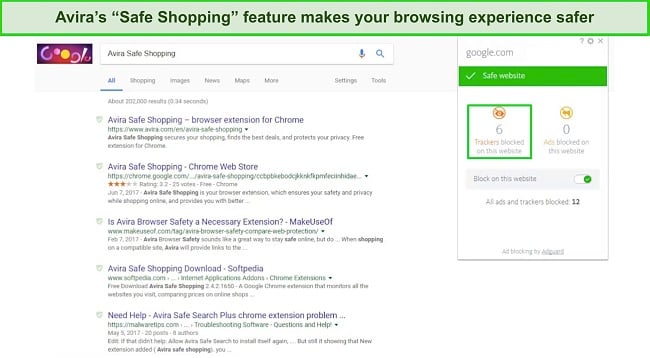
In comparison, Avast offers a few useful extras:
- Ransomware Shield — Protects your vulnerable files and folders and alerts you to any suspicious changes in your protected files.
- Online Security browser extension — Constantly monitors URLs on the web to keep you safe from potentially dangerous websites and malicious files.
- Real Site — Prevents DNS hijacking to secure your login credentials and payment information.
- Sandbox feature — Lets you download and run unknown and potentially harmful applications safely without your PC getting infected.
I’m a big fan of its “Real Site” feature and haven’t seen many antiviruses offer it. DNS hijacking is when a hacker redirects you from a real site to a duplicate one that looks identical, attempting to steal your credit card information. Avast prevents this by providing an encrypted connection to its DNS servers.
Other Features Winner: Avira
11. Device Compatibility — Avira’s Apps Are More User-Friendly
Avira is compatible with a greater range of OS versions, and I found its apps more intuitive and easy to use than Avast’s.
Avira is compatible with the following operating systems:
- Windows 7 or above
- macOS 10.15 or later
- Android 5 or later
- iOS 11 or later
Its Windows and Mac apps have different user interfaces but are easy to use. All features are labeled properly and neatly, and I didn’t have a problem locating any feature on Avira’s dashboard. The only downside I can think of is that when I installed its Windows app, it automatically installed the Opera browser on my PC without my consent.
Avira’s mobile apps on iOS and Android share a similar user interface and are easy to use. They host the same tabs for security, privacy, and performance, though “Security” is labeled as “Protection” on the iOS app. The iOS app also lacks the privacy tools of the Android app, namely camera & microphone protection. I would’ve liked to see more features on its iOS app so it could be at par with some of the iOS-focused antiviruses I’ve used before.
Avast is compatible with the following operating systems:
- Windows 7 or later
- macOS 10.11 or later
- Android 6 or later
- iOS 10 or later
Avast’s desktop apps have a neat and dynamic user interface, with each feature clearly displayed and labeled on the dashboard. The only drawback is the constant upsells on Avast’s free version, trying to coax you into upgrading to a paid plan. I never encountered this problem because I was already on a paid plan. Also, the Mac app doesn’t include a local network scanner that displays IP addresses, among other details of the network you’re connected to. If you’re a regular Mac user like me, I suggest using reliable Mac-focused antiviruses instead.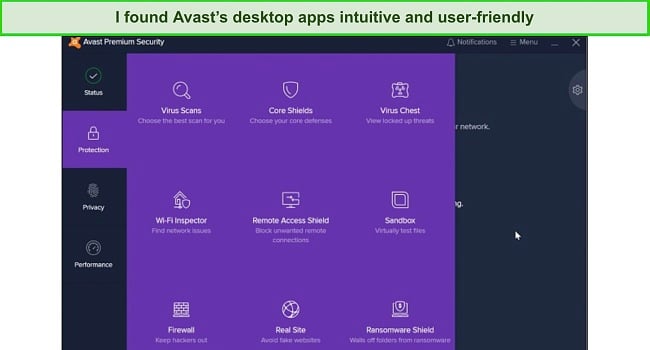
Avast’s mobile apps are equally user-friendly as its desktop apps. I had no trouble locating features, though I must mention that the Android app has more features than the iOS app, including battery enhancement and the “Boost RAM” feature, which suspends unnecessary background processes. I wasn’t concerned about not having these features on my iPhone, as iOS manages its resource optimization quite efficiently.
In summary, Avast is compatible with a greater range of OS versions, but I found Avira’s desktop and mobile apps easier to use and feature-rich than Avast’s. Although I found Norton’s apps easier to use and more feature-rich than both Avira and Avast, I was happy that the two contenders gave me a simple and seamless user experience.
Device Compatibility Winner: Avira
12. Customer Service — Avast Has More Customer Support Options
Although I wasn’t satisfied with either antivirus’s customer support, Avast includes a 24/7 live chat, whereas Avira doesn’t. I consider live chat a must-have for any antivirus because it’s the quickest way to reach out to the support team.
Avast offers 2 customer support options — live chat and online forums. The live chat is hard to find, though. You have to head over to Avast’s knowledge base and select the category your query belongs to. You’ll find an option to connect with a live chat agent there. Once I clicked the live chat option, I had to fill out my personal details in a web form and wait 5 minutes for the agent to respond.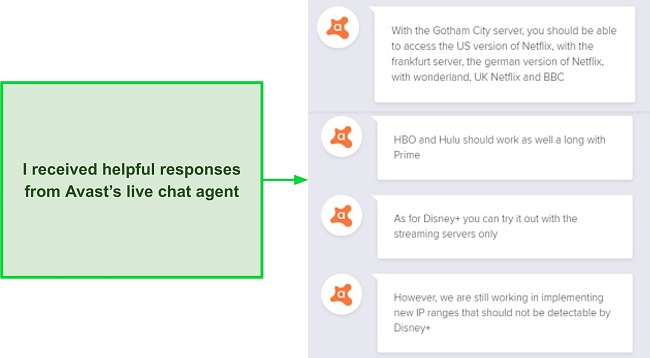
Avast also has a comprehensive and neatly categorized knowledge base, where you can find most of the queries you have. If you don’t find the answer you’re looking for, you can post a query on the forum, and someone (a user, moderator, or Avast employee) will get back to you with a resolution shortly.
Avira has more support options than Avast, including email support, phone support, and an online knowledge base. Unfortunately, it lacks a live chat feature. I contacted the support team via email and got a response 3 days later. I was disappointed by the slow response times, but the agent comprehensively answered my query.
Next, I tried its phone support and was extremely disappointed. Like email support, phone support is only available to paid subscribers. I tried calling multiple times but got an automated reply telling me that the call can’t be completed. Phone support should have been the fastest way to get Avira’s support, but it’s a waste of time.
Lastly, Avira has an easy-to-navigate online knowledge base, the only support option available to free users. You can find troubleshooting guides and information about Avira’s products easily.
Overall, Avast’s customer support leaped miles ahead of Avira’s because it includes a live chat and provides faster response times. However, compared to top competitors like Norton 360, Avast’s response times are significantly slower.
Customer Service Winner: Avast
13. Price — Avira Is Slightly Cheaper and Offers Better Value
After checking out each contender’s price plans and all the features they pack, I concluded that Avira offers better value for the same price than Avast. It offers the following plans:
- Avira Free Security Suite — This free version is of the most feature-rich free plans I’ve seen. It includes an antivirus scanner, real-time protection, Safe Shopping browser extension, Phantom VPN (500MB of data per month), a password manager, and a file shredder.
- Avira Antivirus Pro — It offers all the features of the free plan with few additional features, but it’s not worth the upgrade. Additional features include web and email protection and optimization tools.
- Avira Internet Security — Advanced plan that includes all the features of the previous plans, plus a few extra features that aren’t worth the upgrade. This plan additionally offers a pro version of the password manager (with a password generator), an Automatic Software Updater, and a Driver Updater.
- Antivirus Prime — Premium plan but doesn’t offer the best value for money. It includes all the previous features, plus unlimited VPN usage, a data breach scanner, and a gaming mode.
Avast offers 3 plans — Free Antivirus, Premium Security, and Ultimate. I found the mid-tier plan (Premium Security) offers the best value for money.
- Free Antivirus — Avast’s free plan offers decent protection but significantly fewer features than Avira’s free plan. It includes a handful of security features, such as a virus scanner, ransomware protection, and a WiFi inspector.
- Premium Security — This is Avast’s best value plan that hosts all the features you need to protect your device from threats. It additionally provides a firewall, better ransomware protection than the free plan, DNS hijacking, remote access, and phishing protection. Also, you can use it on up to 10 devices. The only drawback of this plan is that it still has a VPN data cap of 500MB per month.
- Ultimate — Avast’s top-tier plan offers a password manager, improved phishing protection, unlimited VPN usage, and a full suite of optimization tools. I think all these features should be a part of a mid-tier plan and aren’t worth paying extra for.
Overall, Avast’s paid plans are more feature-rich than Avira’s, but those features don’t offer much utility in terms of security and protection. Meanwhile, Avira’s free plan offers every security feature you need to protect yourself against malware. However, Norton provides the best value for your money, given the many features and excellent performance it delivers even on its cheapest plans.
Price Winner: Avira
14. Free Version — Avira’s Free Plan Is Packed With Features
Avira’s free plan is much more feature-rich than Avast’s free plan. I’ve seen other competitors’ free plans lacking even a necessary feature like real-time protection, but Avira offers so much more than that in its free plan.
Apart from providing the basic features of a decent malware scanner and real-time protection, Avira’s free plan includes the “Safe Shopping” browser extension that keeps you safe from malicious sites and files on the internet. It also comes with a VPN with a data cap of 500MB per month, which is useless, but all its paid plans (except the premium plan) have the same limitation. Lastly, it packs a file shredder, which lets you delete files beyond recovery.
On the other hand, Avast’s free plan offers only a handful of features, including a basic virus scanner, ransomware protection, and a WiFi Inspector that ensures you’re connected to a safe network. I feel this is lower than the bare minimum, and if it had offered real-time protection, it would’ve been at par with Avira’s free plan and other free antiviruses I’ve used before.
Free Version Winner: Avira
15. Money-Back Guarantee — Avira Refund Process Is Quicker
Both antiviruses have a 30-day money-back guarantee — the difference lies in how quickly they process refunds. In my experience, Avira processes refund requests faster than Avast does.
I launched my refund request with Avira via its 24/7 live chat. The agent took my request and processed it immediately. However, they did try to convince me to stay but didn’t insist after I refused. I got an email confirmation as soon as I was done talking to the agent and received my refund in just 3 days.
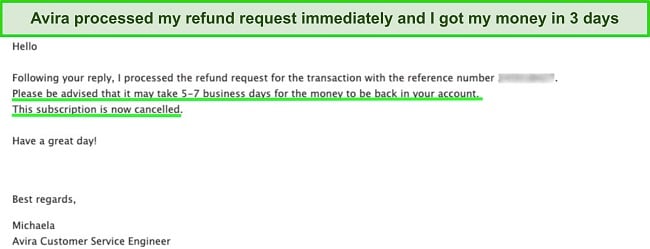
Avast’s refund process was a bit more tedious but also good in a way that I didn’t have to talk to anyone to file a refund. I had to fill out a web form, providing my subscription details to proceed. I received a confirmation email as soon as I submitted the refund form and got my money back in 5 days.
In summary, Avira provided my refund earlier than Avast, which is why it wins this round. However, I was satisfied with both contenders because they gave me a seamless and hassle-free way to get my refund.
Money-Back Guarantee Winner: Avira
And the Winner Is… Avira
Avira outshined Avast in almost every category. It gave me near-perfect detection and exceptional real-time protection, keeping me safe from even the stealthiest of viruses. It also offers a range of security-related extras like Safe Shopping that block you from opening dangerous websites and accidentally downloading malicious files.
- Virus Scanner — Avira
- Real-Time Malware Protection — Avira
- System Performance — Avira
- VPN — Avast
- Parental Controls — Tie
- Firewall — Avast
- Password Manager — Avira
- Gaming Mode — Avast
- Optimization Tools — Avira
- Other Features — Avira
- Device Compatibility — Avira
- Customer Service — Avira
- Price — Avira
- Free Version — Avira
- Money-Back Guarantee — Avira
However, Avast wasn’t too far behind in the contest. In fact, it outperformed Avira in a few important categories, like a firewall. Avast hosts a powerful and highly configurable firewall with advanced settings so you can completely control your internet traffic. You can try it out risk-free with its 30-day money-back guarantee.
On the other hand, Avira doesn’t have its own firewall and relies on Windows Defender — this might be a dealbreaker for some users. Despite lacking a firewall, Avira still manages to provide near-perfect security. Its free version packs a ton of features, including optimization tools, a network traffic manager, and a browser extension that keeps you safe online. I highly recommend you try it without risk using its 30-day money-back guarantee.
Money-Back Guarantee Winner: Avira
How to Download Avira on Your Device
- Choose a product. Go to Avira’s official website, click on “For Home,” and choose a product you want to subscribe to. Make sure to choose the right OS.
![Screenshot of Avira's products on its website]()
- Enter your credentials. You’ll be asked to choose your method of payment, provide your payment information, and address before you checkout.
![Screenshot of Avira's checkout page]()
- Download and install Avira. Install your chosen Avira product on your device and enter the activation key to activate your product license.
![Screenshot of Avira's installation wizard asking for activation code]()
FAQs About Avast and Avira
Which antivirus provides better value for money Avira or Avast?
Is Avira the best antivirus?
If you’re looking for a well-rounded antivirus with perfect scores across the board, I highly recommend using Norton 360. You can test it yourself risk-free using its 60-day money-back guarantee. If you don’t like it, you can request a refund.
Other Top Antiviruses in 2024
Editors’ Note: Private Internet Access, CyberGhost, Intego and Expressvpn are owned by Kape Technologies, our parent company.

